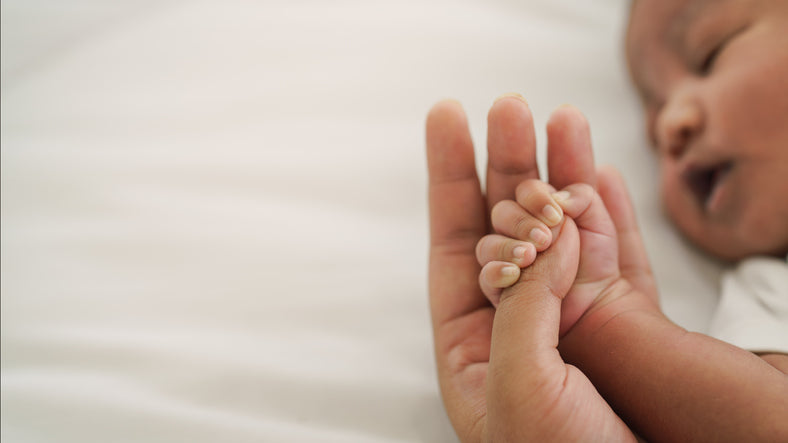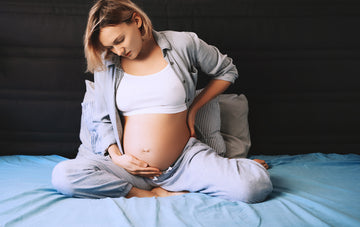The First 48 Hours for Baby

There is no instruction manual that comes with your newborn. However prepared you may think you are, those first few days are quite an adjustment period.
The First 48 Hours With Baby
Skip the Baby Bath: Rub in the vernix! You know, that cheesy, creamy stuff that your baby comes into the world covered in – yes that – RUB IT IN! It is the best thing for baby’s skin. Remember that the skin is the biggest organ and absorbs what is put on it. That vernix serves a greater purpose than any bath ever will.
Skip the Hat: New research shows it is much better for your baby to skip the newborn hat. A hospital likes to use them to hide any imperfections, but in reality they are not needed and can actually make it harder for your baby to regulate his temperature.
Skip the Mittens: Mittens may keep baby from scratching his face, but they also prevent his little fingers from feeling things. The senses at the finger tips are very important for a newborn.
Skin to Skin: You regulate your baby’s body temperature, allow him to hear your heart beating, and keep him as close to the womb as possible. This should be practiced throughout infancy, not just during the first two days.
Body Temperature: Anything over 99.5* needs to be seen by a doctor.
Cord Care: Do nothing. A little sunshine and dry air is enough to heal the cord. Do NOT use alcohol or any other harmful substance. If you really can’t stand it, squirt some breastmilk on it. #BreastmilkHealsEverything
Urinating: The rule of thumb is one wet diaper per day alive.
Meconium: The sticky (GROSS) black, tar-like poop will last the first 2 days or so. This is the meconium and will transition to a mustard-like poop throughout the first few days.
Hiccups: Your baby is learning the whole ‘breathing air’ thing and will have the hiccups frequently. If he does not, there’s nothing to worry about, but if he has them constantly, follow up with the doctor or midwife.
Coughing: Again, coughing is normal – like hiccups – as baby adjusts to the world. Your baby may sound a bit congested, but he isn’t sick. Don’t stress out. However, if your gut is screaming at you, then go have him checked out.
Weight Loss: Babies will lose up to 10% of their birth weight over the first few days, less if you have an unmedicated birth. They should gain it back between 2-3 weeks old.

First 2-hours after birth
Quiet and alert: The perfect opportunity to establish breastfeeding. Evidence shows that babies “imprint” on their first oral experience, and will remember this later. Breastfeeding at this point can also help stop postpartum bleeding. Consider the first feedings as “practice” for both mom and baby. Even if your baby only licks or nuzzles, it is helping to orient baby toward the breast and stimulates milk-producing hormones in the mother.Next 12 hours
Deep sleep: This is the time for both you and your baby to rest and recover from the birth. The breast should be offered every 2-3 hours during the day and every 4-5 hours a night. Most babies do fine with very little to eat during this period.Next 12-36 hours
Hungry: Your baby may seem starving with frequent feeding cues, i.e. licking his lips, hand to mouth, rooting, and crying. This is a normal stage and is meant to stimulate your milk supply. Colostrum is high in fat and protein with special immunities to protect your baby after birth. It also has a laxative effect to clear the meconium after the birth, which helps prevent jaundice. A few teaspoons of colostrum, are equal to an ounce of formula!
Input-Output: We know how much a breastfeeding baby is getting by output. The guideline is one wet diaper for each day of life the first week: 1 wet on day one, 2 wet on day two, etc. Expect 2-3 stools a day, with the stool transitioning from black meconium to green, and finally yellow by Day 4.
Use a chart to record the time and duration of nursing sessions (Every baby is different, but you want at least 8 sessions a day, if not more.) You can keep track of wet diapers and frequency of meconium passing. You can note your baby’s temperature and temperament too. All of this will help you feel more confident in your transition period, and it will give insight to something that could be wrong.
Warning Signs for BABY
Call your doctor immediately if your baby has any of the following:- Temperature over 99.5° or under 97.5°F axillary, or over 100.4° or under 98.4°F rectal
- Respiratory difficulty (noisy “grunting” on the exhale, flaring nostrils with each breath, ribs stick out when inhaling) or becomes blue or grey in the torso and head
- Becomes yellow or orange in the skin or eyes in the first 24 hours
- Lethargy or seizures: If lethargic (can't wake up even with stimulation, is very tired, won't eat) or has seizures (possible signs - eyes rolling upward or fluttering; stiffening of the body; movements of the tongue, lip smacking or excessive sucking; uncontrolled jerking movements or body twitching; staring spells or periods of unresponsiveness)
- Develops high-pitched cry
- Baby will not feed
- Skin bruising or unusual bleeding, especially ANY bleeding from a circumcision as babies are very sensitive to blood loss







